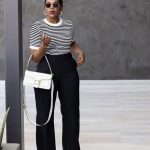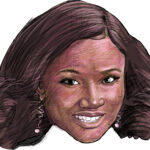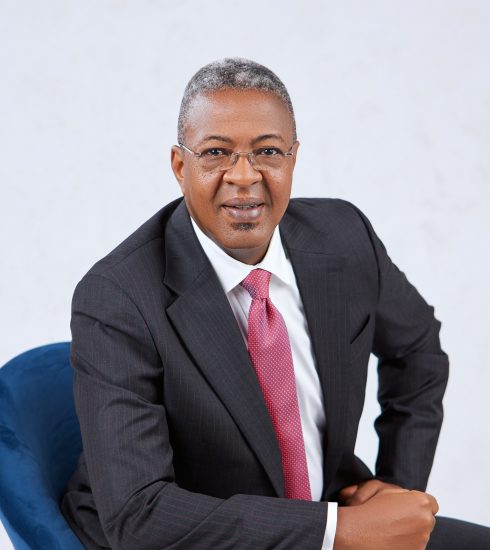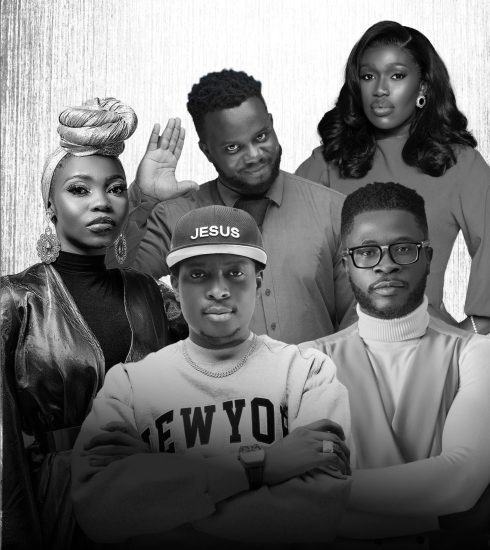DEMOCRATIC ELECTIONS, Our Civic Chore
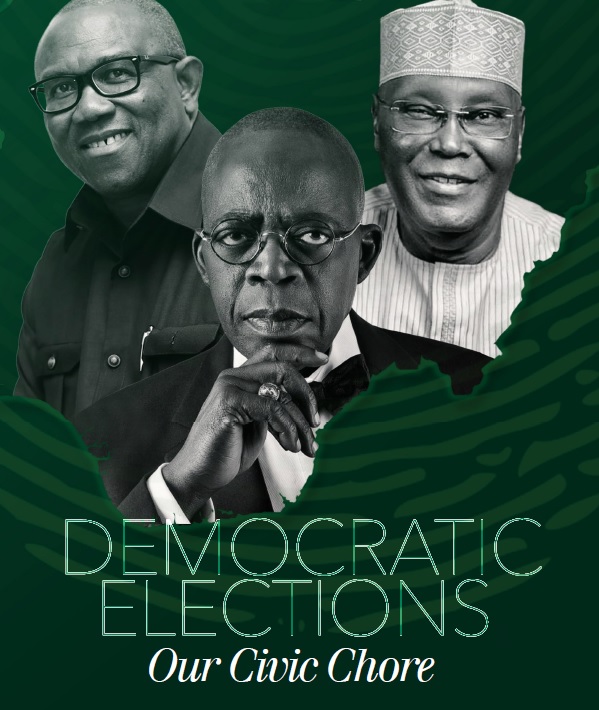
On the 25th of February 2023, presidential and national assembly elections will be held in Nigeria to elect the President, Vice President, and members of the Senate and House of Representatives.
The Election is billed to be the most significant event in the country’s recent history. Still burning from the rigours of the 2020 #EndSARS protest, this week’s general elections have become a focal point for people’s political inclination in the past couple of years. Because of that, especially for the youths—notorious for their apolitical demeanour—this voting season holds utmost significance.
Our Lifelong Struggle For Democracy
Before we got to a point where an incumbent (ex-President, Goodluck Jonathan) willingly surrendered the mantle of leadership, to the world’s surprise, Nigeria’s political process had always felt like a do-or-die affair. In the true sense of the word, democracy is a system of government by the whole population or all the eligible members of a state, typically through elected representatives. Unlike military dictatorship, democracy allows for freedom of expression and association, which, as we have seen with western countries, creates a space for polarising political ideologies.
A long-standing, tumultuous relationship exists between the military and Nigeria’s democracy.
Nigeria has been governed by the military, as opposed to civilian officials, for about half of its post-independent state.
Since gaining independence in 1960, three republics have been overturned by military coups; two of the four democratically elected presidents of Nigeria’s fourth republic were in charge of those military dictatorships.
Between coups and counter-coups, with a recycled leadership that has seen former coup plotters become democratically elected presidents, Nigeria finally found its democratic footing in 1999 when the fourth republic’s general elections saw former military ruler, Olusegun Obasanjo, elected president on the platform of the People’s Democratic Party (PDP), a broad coalition of political elites and power brokers. Obasanjo served two four-year terms in office in what was the beginning of the longest period of uninterrupted democratic government.
The incumbent is another former military leader, Muhammadu Buhari, who is also on the tail end of his second term.
Nigeria’s democratic constitution today features a Presidential system of government fashioned upon the United States’ political system. The president is in charge of the executive arm, the National Assembly, Senate and House of Representatives formed the legislative arm, and the Supreme Court, the apex court of the land, heads the judicial arm.
A Weird Politics
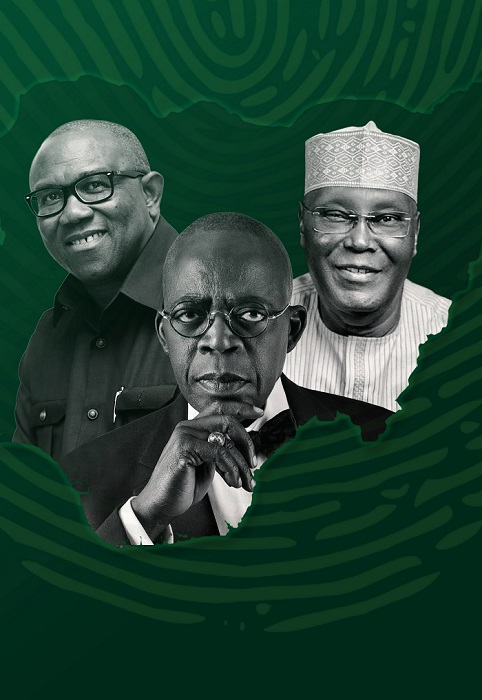
In most western countries, politics is usually made up of two major parties with different ideologies – a conservative right-wing party and a liberal left-wing party. Although this fosters the division of people through politics, it is a system that allows for clear principles and identities.
In Nigeria, this doesn’t exist. Although two major parties would fiercely contest power at the federal level— the PDP, as mentioned earlier and the All Progressives Congress (APC)—today, it only began about a decade ago. Founded on the 6th of February 2013 from a merger of Nigeria’s largest opposition parties, namely, the Action Congress of Nigeria; the new PDP; the Congress for Progressives Change, the All Nigeria Peoples Party (ANPP) and the faction of the All Progressive Grand Alliance, (APGA), the party came to power following the victory of its candidate, Muhammadu Buhari in the 2015 presidential election, marking the first time in Nigerian history that an opposition party unseated an incumbent president and power was transferred peacefully.
Since the APC’s formation and its eventual tremendous growth and influence, politicians have been defecting back and forth between prominent parties. In 2013, five governors (from Adamawa, Kano, Kwara, River, and Sokoto), 37 representatives and 11 senators left the PDP. They formed the All Progressives Congress (APC), giving life to a newly created opposition party. Many of the same individuals that left the PDP in 2013 are involved in a recent move to PDP. Earlier this month, 15 senators, 37 representatives, and three state governors left the APC and joined other political parties—PDP picked up a majority of these disaffected politicians.
As the 2019 General Elections got closer political parties tried to find an edge over each other. Political parties are important institutions for developing policies and platforms and providing critical oversight and accountability of government action. Political parties implement policies that reflect the party’s ideology through their elected representatives.
However, this is different in Nigeria. Moving from one political party to another is common and seen as a way of gaining an advantage over other political parties. For example, Nigeria’s current president, while he was never a member of the PDP, did move between various political parties in his quest to become the number one citizen of Nigeria. In 2003 and 2007, he contested for the presidency on the All Nigeria People’s Party (ANPP) platform. In 2011, he was the presidential candidate of the Congress for Progressive Change (CPC), a party he founded. And as aforementioned, he won the APC presidential primary in 2014 and was elected president on the 28th of March, 2015.
This year’s election has already seen a party switch action as Labour Party’s presidential candidate, Peter Obi, abandoned the PDP over a fear of inevitably losing out on the party’s President, Atiku Abubakar. This would not be the first time Obi, a two-term former Governor of Anambra State, switched parties. Although initially a PDP partisan, Obi defected to the All Progressives Grand Alliance (APGA) in 2002 and won the gubernatorial election five years later owing to the party’s stronghold of Anambra State. He defected back to the PDP on completion of his full two-term governorship.
So why do Nigerian politicians bounce between political parties? Political parties in Nigeria, and other parts of the African continent, tend to lack ideologies and explicit messages that separate them from each other.
Because of the country’s tribal, religious and geographic divide, political parties are driven by personalities instead of ideologies. For example, in the United States, political parties are defined by their platforms, or manifestoes, as they are called in Nigeria. So, if a Republican candidate comes knocking at your door, you know where they stand on the current critical issues, as is a Democrat.
That is not the case in Nigeria. During a pre-election (before the 2019 general elections) assessment mission conducted by the IRI and the National Democratic Institute (NDI), the delegation heard from numerous Nigerians who “expressed frustration with political parties, which are seen as personality-driven and lacking internal democracy. Emerging political alliances are based mostly on personalities and agreements among political leaders and do not necessarily reflect policy preference or ideology differences.”
When a politician defects, they usually move with thousands of individuals, including officials of the party that they are leaving. While political parties are vessels to government and power worldwide, they are the only way to get into government in Nigeria. There is no independent candidature, so every person must contest under the logo of a political party.
There is no independent candidature, so every person must contest under the logo of a political party.
Free And Fair Elections, An INEC Responsibility
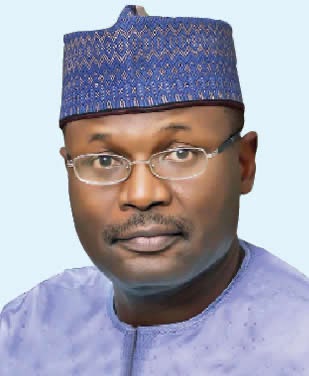
INEC Chairman, Prof. Mahmood Yakubu
Several uncertainties from candidate declarations often cloud general elections in Nigeria until the inauguration. For most Nigerians, the conviction that we have never had a free and fair election void of corrupt practices is strong. In this part of the world where poverty has been weaponised as a tool to control the masses, the election seasons are often seen as an opportunity to offer tokens and handouts for favours in the polls. There have been many things in the past, from food stock to cash rewards, politicians turn to petty incentives, during campaigns and even on election day, in a bid to sway voters.
Nigerian politicians are notorious for their byany- means-necessary approach to elections in the country. Although everyone is privy to it, attempts to clamp down on it have been futile.
A large chunk of this responsibility falls on the shoulders of the Independent National Electoral Commission, established in 1998 to serve as the electoral body overseeing Nigeria’s elections.
Having conducted controversial elections in the past that borders on voter suppression and underage voters registration—especially in the North, a lack of structure in place to mitigate the threats of political unrest and violence fixated on disrupting the electoral process, which in several cases involve ballot box theft operations, the INEC has hefty exceptions to get things right this time around finally, the seventh quadrennial general elections in the fourth republic.
A THREE-HORSE RACE FOR THE FIRST TIME EVER
Peter Gregory Obi (LP), 61—Running Mate: Yusuf Datti Baba-Ahmed
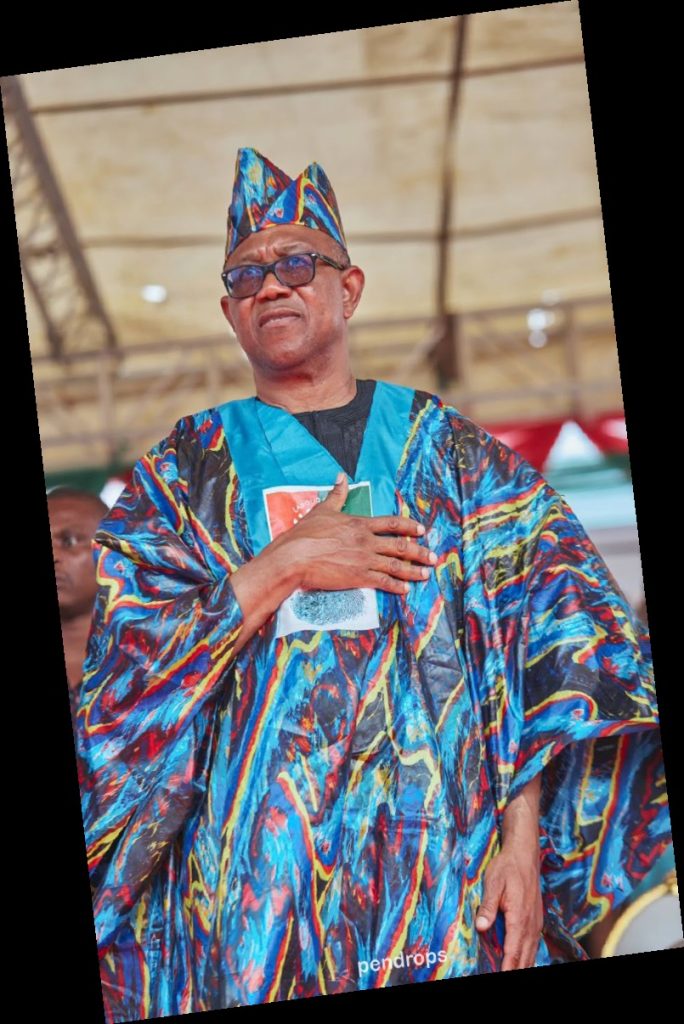
Born in Onitsha in 1961, Obi graduated from the University of Nigeria in 1984.
Afterwards, he entered business and banking, eventually holding several executive positions at banks. Obi ran for governor in 2003 as a member of the All Progressives Grand Alliance, but Chris Ngige was declared the winner of the election. In 2006, the election of Chris Ngige was nullified, and Obi was declared the winner of the 2003 election, and he assumed office in March 2006. He was impeached in November of the same year, but his impeachment was overturned, and he returned to office in February 2007. In 2010, he was reelected for a second term.
After leaving office in 2014, Obi defected to the Peoples Democratic Party. In 2019, he was selected as the PDP vice presidential nominee in the presidential election running alongside Atiku Abubakar. Still, the ticket lost to incumbent President Muhammadu Buhari and vice president Yemi Osinbajo. In 2022, Obi ran for president of the republic of Nigeria himself, first in the PDP until defecting to the LP in May 2022, obtaining the party’s ticket. Obi’s presidential campaign has been described as populist and has been noted for its support among many young Nigerians, nicknamed “Obidients.”
Atiku Abubakar (PDP), 76 – Running Mate: Ifeanyichukwu Arthur Okowa
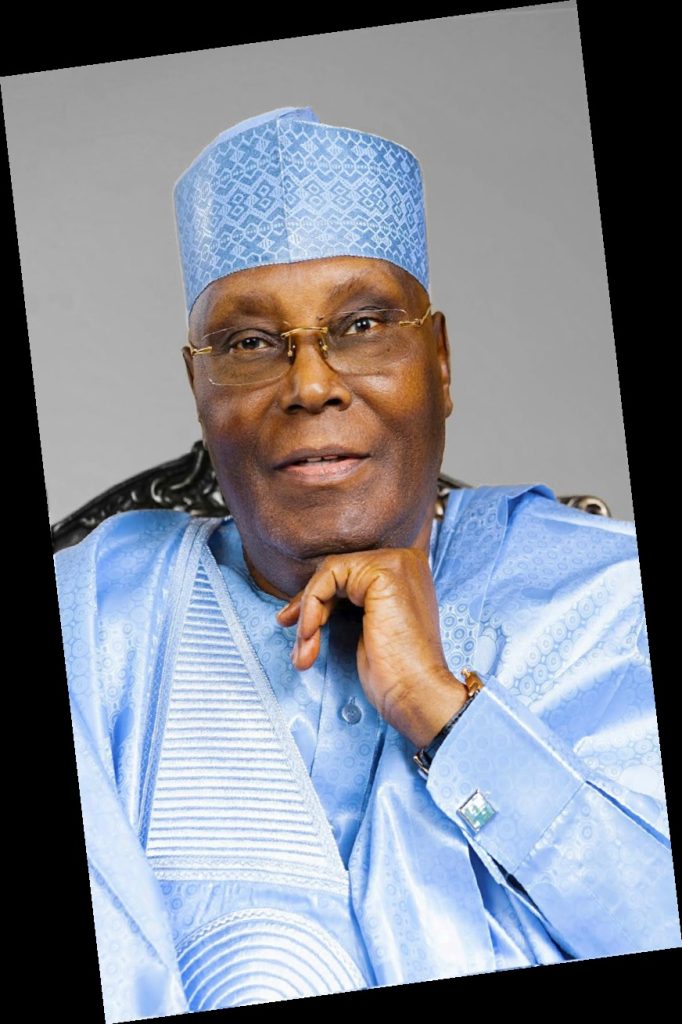
Atiku Abubakar ran unsuccessfully for President of Nigeria five times in 1993, 2007, 2011, 2015, and 2019. He participated in the Social Democratic Party presidential primaries in 1993 but lost to Moshood Abiola and Baba Gana Kingibe. He was a presidential candidate of the Action Congress in the 2007 presidential election, coming third to Umaru Yar’Adua of the PDP and Muhammadu Buhari of the ANPP. He contested the presidential primaries of the People’s Democratic Party during the 2011 presidential election losing out to incumbent President Goodluck Jonathan. In 2014, he joined the All Progressives Congress ahead of the 2015 presidential election and contested the presidential primaries losing to Muhammadu Buhari. In 2017, he returned to the Peoples Democratic Party and was the party’s presidential candidate during the 2019 presidential election— again, losing to incumbent President Muhammadu Buhari.
In May 2022, he was chosen as the Peoples Democratic Party presidential candidate for the 2023 general election after he defeated Nyesom Wike, the current Governor of Rivers State, in the primaries.
Bola Ahmed Tinubu (APC), 70 – Running Mate: Kashim Shettima
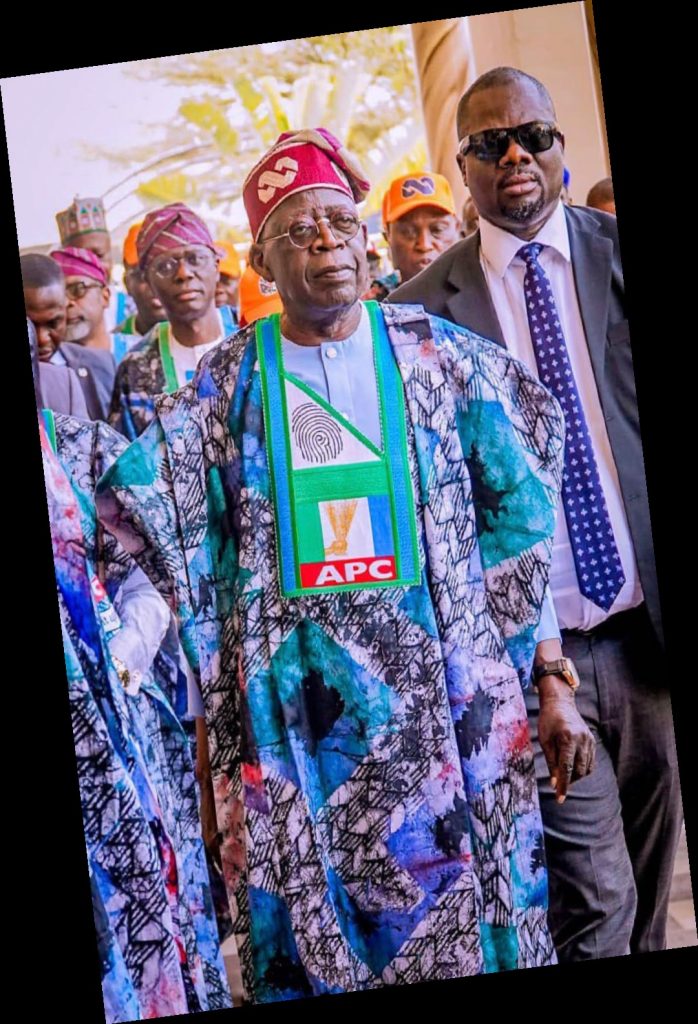
Tinubu spent his early life in southwestern Nigeria and later moved to the United States, where he studied Accounting at Chicago State University. He returned to Nigeria in the early 1980s and was employed by Mobil Nigeria as an accountant before entering politics as a Lagos West senatorial candidate in 1992 under the banner of the Social Democratic Party. After late Dictator, Sani Abacha dissolved the Senate in 1993, Tinubu became an activist campaigning for the return of democracy as a member of the National Democratic Coalition (NADECO) movement. Although he was forced into exile in 1994, Tinubu returned after Abacha’s death in 1998, which triggered the beginning of the transition to the Fourth Republic.
In the first post-transition Lagos State gubernatorial election, Tinubu won by a wide margin as a member of the Alliance for Democracy over the Peoples Democratic Party’s Dapo Sarumi and the All People’s Party’s, Nosirudeen Kekere-Ekun. Four years later, he won re-election to a second term over the PDP’s Funsho Williams by a reduced margin. Tinubu’s two terms were marked by attempts at modernising the city of Lagos and his feuds with the PDP-controlled federal government. After leaving office in 2007, he played a crucial role in the formation of the All Progressives Congress in 2013.
His decision to pick the current Senator and former Governor of Borno State sparked a wide-range controversy as their Muslim- Muslim presidential ticket is unprecedented in the history of Nigerian politics. Long and controversial, Tinubu’s career has been plagued by corruption accusations and questions about his personal history’s veracity.
A LACK OF PRESIDENTIAL DEBATE TO DATE
Several opinions and ideologies characterise democracy. Unlike the military regime, where the dictator has the ultimate power and control, a democratic electoral process allows candidates vying for the top position to air their political views, visions and ideas to the general public. As a result, manifestos and organised debates are significant elements of most democratic electoral processes—not in Nigeria, unfortunately.
On two occasions leading up to both elections that saw him presiding over Nigeria for two full terms, Muhammadu Buhari declined invitations to debate his opponents. The PDP Campaign Organisation at the time said that the decision by the APC not to participate in the presidential debate organised by the Broadcasting Organisation of Nigeria (BON) was to shield its candidate from Nigerians and the international audience, alleging that it was also meant to hide the candidate’s inability to constructively engage on contemporary national issues in a live television and radio debate. This was in response to the APC Presidential Campaign Organisation’s announcement that its candidate would not participate in the debate because the organisers, BON, are supporters of the PDP. This development, coined from a flimsy excuse, robbed Nigerians of a customary element of democracy, the right to hear directly from aspirants on their plans for the country.
Nigeria would go to hold its first televised live Presidential debate at Transcorp Hilton, Abuja, on Saturday, the 19th of January 2019. Moderated by prominent journalist, Mark Segun Eddo, the debate had three out of five invited candidates in attendance after President Muhammadu Buhari of the ruling APC and Atiku Abubakar, PDP, failed to attend the debate. Interestingly, Abubakar, flagbearer of the main opposition party, had graced the venue only to decline the invitation after learning that the President and Commander in Chief would not be attending.
Lightning struck again for a third time when they cancelled the presidential debate scheduled last year. Presidential candidates of the APC, Bola Tinubu, Labour party’s Peter Obi, and Atiku Abubakar of the PDP were among the leading contenders scheduled for the debate. The APC were again the first to indicate that its flagbearer, Tinubu, might not honour invitations for debates with other presidential candidates.
The party’s presidential campaign spokesman, Festus Keyamo, said Tinubu’s ‘hectic campaign schedule’ will not permit him to be part of the debates. Keyamo said Tinubu did not attend a presidential town hall meeting with other candidates because he received a lot of invitations from television and radio stations, and it would be unfair to any of the broadcast houses if he had attended.
As retaliation, the Director General of the Labour Party’s Campaign Organisation, Doyin Okupe, said the party’s aspirant, Peter Obi, will no longer show up for debates if his counterparts in other parties do not show up. Nigeria is yet to have an intellectual face-off between presidential aspirants to date.



